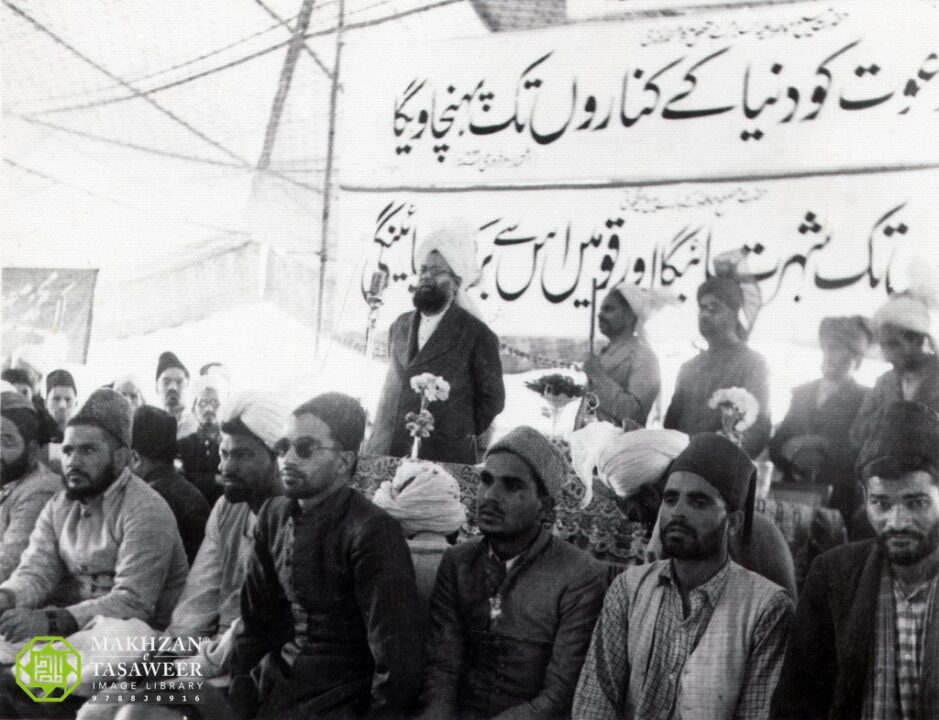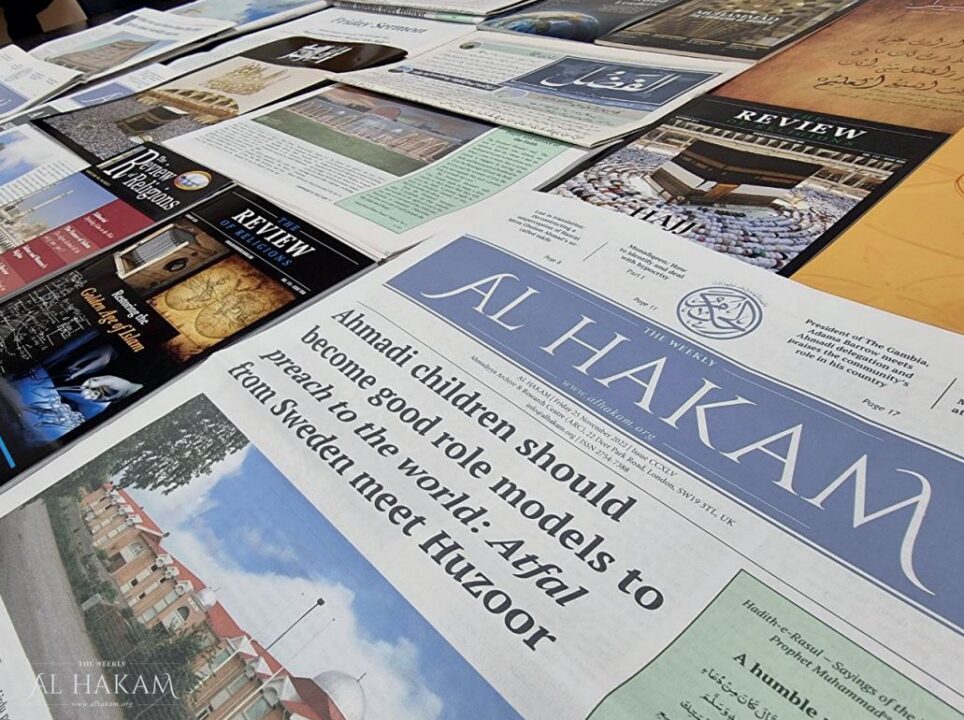Ata-ul-Haye Nasir, Al Hakam

During his Friday Sermon on 18 January 1924, Hazrat Musleh-e-Maud, Mirza Bashiruddin Mahmud Ahmadra drew the attention of members of the Jamaat toward excelling in the field of writing and discourse, and toward utilising these skills for the propagation of Islam.
Huzoorra said that it is the heartfelt desire of each and every Ahmadi to witness the spread of Islam across the world; however, along with such a desire, one is required to utilise the required methods to achieve this goal. It is a very huge task to spread Islam the world over, in fact, it is a spiritual contest with the whole world. There is a need to make full efforts to fulfil this desire and objective. He said:
“It is not an easy task to convince someone to change their beliefs. […] No community would ever come to you themselves and request that you make them Muslims; but rather, you will have to convince them. However, if one does not make efforts and does not utilise the methods that have been set to succeed in this objective, how could they say that this task would be accomplished through prayers alone. In fact, prayers should be accompanied by efforts as well. […]
“We wish that Islam may spread all around the world and all people may accept the truth, however, how could we succeed in this [spiritual] contest without utilising the required methods. Anyhow, we must utilise those methods and means – regardless of how few they may be, in comparison to those available to our opponents – and we should exert all of our power and efforts for this cause. Once we do this, the help and succour of God Almighty would descend for us, and we would succeed in all fields.” (Khutbat-e-Mahmud, Vol. 8, pp. 294-295)
Huzoorra continued:
“This age has been called the age of propagation of the faith [ishaat-e-hidayat], and the age of arguments, instead of the sword. In this era, one is required to carry out jihad through speaking and writing. […] If one desires to succeed in this [spiritual] contest, they are required to utilise the means that are essential to achieve the victory, and then hope for God’s succour to come. A nation that does not prepare in advance, can never succeed in a time of need.
“As I have said earlier, this is the age of Islam’s propagation through arguments and proofs. For this reason, if [the members of] our Jamaat do not train themselves in the fields of speaking and writing, they could not succeed in propagating Islam. Those who have writing skills, should use their pen, and those who are skilled in speaking or can learn it, should use their speaking abilities. […]
“I advise the members to shun their indolence. God Almighty has granted a tongue to everyone, and therefore, they should use it to propagate the truth, and those who have the writing ability, should use their speaking and writing skills. Those who are not well-versed in writing, can learn this ability. There is nothing that cannot be learned through effort. […] I have called attention to this matter in the past and I will do so once again. […] I hope that my advice will not go in vain, and the writers in our Jamaat will pay attention to this.
“I read the newspapers of the Jamaat regularly, and it makes me wonder why there are only two or three writers who write for the newspapers and magazines of the Jamaat. The others consider it to be the responsibility of the editors to write articles, and deem themselves free from this duty. […] One finds in the newspapers that either the editors are writing articles, or some of those students, who are trying to sharpen and practise their writing talent. However, those who are well-versed in writing articles or can become good writers and speakers with very little effort, are silent.

“I advise you all to pay attention to speaking and writing; however, this should not mean that whatever they write, must be published. There are many who complain to me that ‘I sent an article but the editor did not publish it.’ I respond to them by saying that it is the duty of an editor to decide whether to publish a certain article or not, and to see as to which articles are eligible to be published, and which ones are not. This is their duty, leave that to them. […] Therefore, it is not compulsory that every article one writes for a newspaper be published. The editor will publish whichever article he deems appropriate. However, everyone is required to practise essay writing, and strive to make their article eligible to be published in the newspaper. Once their article reaches such a quality, then why would the editor not publish it? […]
“There might be hundreds of essay writers in our Jamaat, or can become in the future, whose articles would be published by the editors of various newspapers and magazines with great pride. In the same way, one should practise delivering lectures as well.
“In addition to the lectures, one could preach the religion in their personal gatherings. However, I find that many who could serve the religion during their discussions in various gatherings, occupy themselves in discussing worldly matters, instead of religious matters, whereas, it would be very beneficial if they try to carry out tabligh during those gatherings.” (Ibid, pp. 296-298)
Towards the end, Huzoorra said:
“There is a great need for our Jamaat to advance in fields of writing and discourse. Every Ahmadi is required to practise their writing and speaking abilities. The one who will utilise their speaking and writing abilities to serve the religion, would bring the victory [of Islam] nearer. Our Jamaat needs to utilise the beneficial means for the propagation [of Islam], so that the Greatness and Might of God may manifest, and may the truthfulness of the true religion prevail.” (Ibid, p. 299)
During his address at the Jalsa Salana Rabwah, on 27 December 1953, Huzoorra said:
“The authors of our newspapers and magazines, and the educated members of the Jamaat are required to pay attention to writing academic articles as much as possible.” (Anwar-ul-Ulum, Vol. 24, p. 182)
Huzoorra continued by advising the members to write research articles for the Jamaat’s periodicals, and to present fresh arguments to prove the truthfulness of Islamic teachings.
Hazrat Musleh-e-Maudra has also granted guidance as to how the Ahmadi authors can create an impact in their writings. During his Friday Sermon on 10 July 1931, Huzoorra advised the Ahmadi authors to adopt the Promised Messiah’sas style of writing and said:
“The personage of the Promised Messiahas has manifested so many blessings in this world, and one of the greatest blessings is his style of writing. […] The Promised Messiah’sas writings, in addition to being powerful, remain serious and dignified as well. […] Our writings need to be in accordance with the Promised Messiah’sas style [of writing], so that this tradition continues in the future in such a way that it can also be considered a reminder of [the Promised Messiahas]. […]
“Thus, the authors of our newspapers, magazines and books are required to study the Promised Messiah’sas writings in such a manner that it enables them to follow his style of writing. They should not attempt to follow that literature, which comprises an aspect of ridicule and mockery. In this way, they will be able to render twofold services: first, the propagation of the arguments presented by the Promised Messiahas, and second, the continuation of his style of writing. […]
“The Promised Messiah’s [style of] writing possesses such a power of attraction that following his style of writing creates immense power and attraction in one’s writing in comparison to others. […] The example of the flow of the Promised Messiah’sas writings, is like water flowing down the mountains; apparently, its direction is not known, but it makes its own way. Divine Majesty is manifested through the writings of the Promised Messiahas, and they are free of any kind of artificiality. […] All other writings are mere paintings, whereas, the Promised Messiah’sas writings are a natural scene.” (Khutbat-e-Mahmud, Vol. 13, pp. 218-221)
May Allah the Almighty enable all of us to utilise our speaking and writing abilities to serve Islam. Amin

